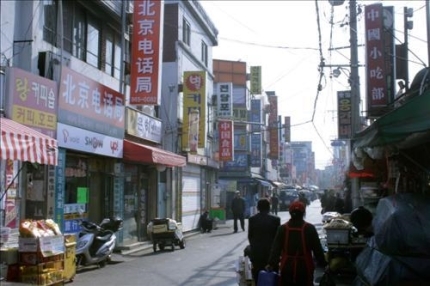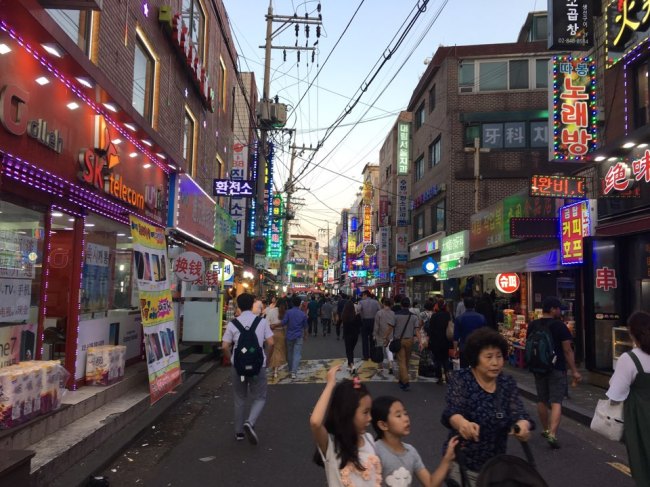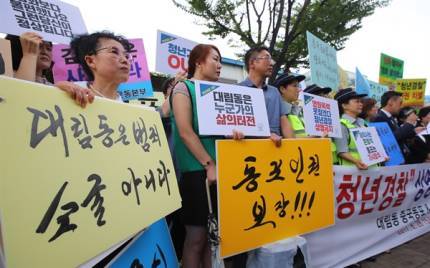[Feature] Ethnic Korean-Chinese fight ‘criminal’ stigma in Korea
By Ock Hyun-juPublished : Oct. 4, 2017 - 11:40
Outside Exit 12 of Daerim Station, the main street is lined with restaurants bearing Chinese signs and street food stalls. They lure Chinese of Korean descent living and working here with the taste of home -- northeastern China.
The Daerim-dong area is the largest enclave of the ethnic Korean-Chinese community, or joseon-jok, in Seoul, but this vibrant neighborhood has become a place that many South Koreans avoid at night.
The Daerim-dong area is the largest enclave of the ethnic Korean-Chinese community, or joseon-jok, in Seoul, but this vibrant neighborhood has become a place that many South Koreans avoid at night.

“I wouldn’t go there at night, to be honest,” said a 31-year-old man, who only gave his surname Seo and has never been to Daerim-dong.
“Based on what I saw in movies and heard from others, the image that springs to mind when I think of Joseon-jok is that they are scary people and Daerim-dong is a scary place,” he said.
Despite their vast number here -- some say there are up to 700,000 -- ethnic Korean-Chinese people are one of the most stigmatized minorities, often associated with heinous crimes as depicted in local media.
According to a 2015 survey on 248 Koreans in their 20s and 30s by Korea Research Center, 59 percent of the respondents had negative perceptions about them. Some 70 percent admitted that Korean society discriminated against Joseon-jok.
Ethnic Korean-Chinese fighting prejudice
Joseon-jok’s anger and frustration about their image recently reached a boiling point, following the release of the film “Midnight Runners.”
The action-comedy flick triggered outrage among Joseon-jok, who say it spreads the long-standing stigma labeling them as potential criminals and depicting Daerim-dong as an unsafe place.

Some 70 ethnic Korean-Chinese people held a protest on Aug. 28 against the film’s producer and distributor in Daerim-dong, demanding the suspension of the movie’s screening, an official apology and financial compensation.
In the film, Daerim-dong is depicted as a lawless district where “even police cannot enter” and “undocumented Chinese wield knives.” It also shows Joseon-jok gangsters kidnapping runaway teens to sell their organs. The movie garnered more than 5.6 million viewers as of Sept. 19 since its release in August.
“I know films are fictional, but such a film has an adverse impact on us. When this kind of film is out, Koreans treat us like criminals who they should avoid,” said Kim Suk-za, the head of Ethnic Korean-Chinese Association.
“We have tried to shed the image for decades by abiding by local law, patrolling our neighborhood and picking up trash, but I am so sad that it seems like all of our efforts are in vain.”

It is not the first time that ethnic Korean-Chinese people have been portrayed as criminals. In the flick “Yellow Sea” (2010), the main character is an ethnic Korean-Chinese contract killer. In the movie “China Town” (2015), a Joseon-jok gang is depicted as selling human organs.
“We try to earn money and form a family while abiding by the law so as not to be kicked out. Why should I be treated like a potential criminal? It is humiliating,” said a 46-year-old Chinese man of Korean ethnicity, who only gave his surname Choi.
Descendants of Koreans who migrated to China centuries ago began to move back to South Korea in 1992 when the country opened diplomatic relations with China. They came here mostly to seek economic opportunities as speaking the same language and sharing the same ethnicity made it easier for them to get a job here.
Joseon-jok largely settled in Daerim-dong and Garibong-dong, where there were many factories and affordable housing.
Yang Soon-young, 46, who runs a Chinese restaurant selling lamb skewers, says that the film has taken a toll on her business.
“Some 30 percent of my customers used to be Koreans. I get almost no Korean customers now,” said Yang. “I think it might be because of the image that Daerim-dong is a breeding ground for crimes.”
“I worked hard, did jobs Koreans were reluctant to do and paid taxes. But this is still how Koreans see us,” she said. “My life in Korea is difficult enough, but such a prejudice makes it even more miserable.”
The growing anti-Chinese sentiment in Korea amid a diplomatic row with China over the deployment of a US anti-missile system here further deals a blow to the ethnic Korean-Chinese community.
Since South Korea decided to deploy the Terminal High Altitude Area Defense system here last year to defend against the North’s missile threats, China has taken what appears to be retaliatory measures, such as a ban on the sale of package tours to South Korea. China has strongly opposed the missile defense system, saying it is a threat to its own security.
“The decision to deploy THAAD took a toll on our businesses. Many Joseon-jok heavily rely on businesses with Chinese. We can earn money when Chinese tourists and traders come to Korea,” said Baik Soon-ok, a staff member at a travel agency for Chinese tourists.
“I used to arrange 100 tours for groups of Chinese, let’s say, now I only see one tour group coming to Korea.”
Reality behind prejudice
The stigma against joseok-jok is largely based on some highly publicized crime cases involving ethnic Korean-Chinese over the past decade.
In 2012, Oh Won-choon, a Korean-Chinese man, was sentenced to life in prison for abducting and murdering a 28-year-old woman and dismembering her body in Suwon, Gyeonggi Province. His cruelty shocked the public, as the victim’s body was chopped into more than 300 pieces.

In another high-profile murder case, Korean-Chinese Park Chun-pung brutally butchered his girlfriend, also a Korean-Chinese, in Suwon in 2014. He also received a life sentence in jail.
But on average, foreign residents are less likely to commit crimes than Koreans, government data shows.
According to a 2014 crime analysis by the Supreme Prosecutors’ Office, there were 28,456 crimes committed by foreigners, putting their crime rate at 1.6 percent. As for Koreans, 1.87 million crimes were committed, placing the crime rate at 3.7 percent. The study, however, did not look specifically at Chinese nationals.
In Daerim-dong, where 1 in 4 residents are ethnic Korean-Chinese, 471 severe crimes, including murder and rape, took place in the first half of this year, down 25 percent compared to the same period a year earlier.
“The reality in Daerim-dong is completely different from how it was depicted in the film,” said a police officer working in the area, who declined to be named. “The public safety in this area is not particularly worse than other areas.”

To shed the “criminal” image stuck in many Koreans’ minds, some 70 Korean-Chinese residents have voluntarily patrolled the neighborhood in turns to boost public safety since 2010.
“I have rarely seen violence or murder in recent years in Daerim-dong. Things have changed a lot, compared to 20 years ago. We feel safe,” said Kim, the head of Ethnic Korean-Chinese Association.
How prejudice was shaped
The way ethnic Korean-Chinese are depicted in films is a reflection of how ordinary Koreans perceive them and such a perception has been formed over decades, an expert said.
“Many of the Koreans who say Joseon-jok are scary have not even met them in person,” said Lee Jean-young, a politics professor at Inha University.
“In the early years of their settlement, many Chinese of Korean descent, who mostly came from rural areas and had a low level of education, did not follow the rules of public etiquette, for example, spitting on streets and littering anywhere, which was not appropriate by Korean standards,” said Lee.

Furthermore, media reports about crimes by ethnic Korean-Chinese people and the depiction of them as criminals on TV worsened the “distrust and hatred” toward them, he explained.
In addition, there is a large number of ethnic Korean-Chinese here.
“As Koreans are faced with them more often than other foreigners, it is easier to spot Joseon-jok behavior that makes them feel uncomfortable,” said Oh Jung-eun, a senior researcher for IOM Migration Research and Training Centre.
As of the end of 2016, the number of foreigners in Korea was 2.04 million, with the majority, or 49.6 percent, holding Chinese nationality.
The ethnic Korean-Chinese community believes that there are about 700,000 ethnic Korean-Chinese residents settled in Korea, the biggest group of ethnic Korean-Chinese outside their enclave in Northeast China.
There are an estimated 1.8 million ethnic Korean-Chinese around the world. Many are descendants of Korean refugees and independent movement fighters who fled Korea to escape Japanese colonial rule.
Ethnic Korean-Chinese people’s low social and economic statuses are also behind Koreans’ largely unfavorable feelings toward them, Oh said.
“South Koreans encounter Chinese of Korean descent in their everyday lives as low-skilled workers who moved to Korea to do blue-collar jobs. That likely led to Koreans looking down on them and treating them as a lower class in society.”
Most Chinese of Korean ethnicity come here on C-3, F-4 and H-2 visas, which are given to overseas Koreans. Men usually work at construction sites and women find jobs as caretakers, nannies and restaurant servers, with most of them at the bottom of the income scale.
Shin Hae-ran, a geography professor at Seoul National University, said that ethnic Korean-Chinese people publicly protesting against the stigma could be a positive step for society.
“Existing prejudice against women, children and animals have been eroding little by little while going through conflicts in society, which has not acknowledged them as equal citizens,” Shin said.
“Ethnic Korean-Chinese are taking collective action, so people are taking interest in the reality (behind the bias), which is one of the ways to respond to (the prejudice.)”
By Ock Hyun-ju (laeticia.ock@heraldcorp.com)
-
Articles by Ock Hyun-ju



















![[Today’s K-pop] Treasure to publish magazine for debut anniversary](http://res.heraldm.com/phpwas/restmb_idxmake.php?idx=642&simg=/content/image/2024/07/26/20240726050551_0.jpg&u=)